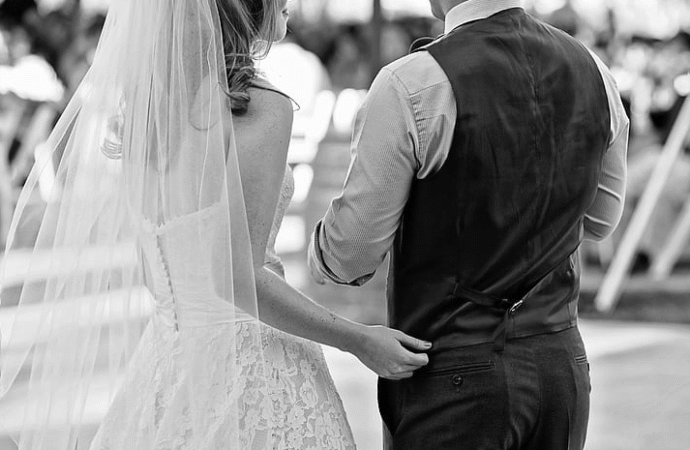“Don’t get married until your ‘brain is fully developed’ – after 25.”
“Don’t get married until you ‘travel the world.’”
“Don’t get married until you get a master’s degree, then a PhD, then study abroad.”
“Don’t get married until you date around and ‘figure out what you want.’”
“Don’t get married until you ‘find yourself.’”
These are just a few of the many pieces of advice offered to the younger generations today. Such advice endorses the idea of a “capstone marriage,” where marriage is pursued only after an individual has crafted him/herself into a perfect specimen of a human.
While likely well-meaning, such advice also comes with its consequences. Before you know it, these young people are choosing from a smaller pool of available singles. They’re also facing a narrowing window of youth in which to do the physically taxing work of bearing and raising children. But at least they’ve found themselves, and just in time to form a new self-identity in a partnership formed with a completely different person who has also just found him/herself!
However, the modern idea of a “capstone marriage” is detrimental to both forming and maintaining marriages.
Before exploring capstone marriage further, however, let’s address all the usual interjections against young, “cornerstone marriages.”
For starters, no, young marriage is not a good in itself. Marrying the right person is more important than marrying young. Not everyone is still searching for a life partner in their 30s, doing so because they digested too much pop psychology about self-actualization. There are circumstances in which searching for marriage should be postponed in order to sort out personal issues or problems. Men, especially, should (ideally) be gainfully employed, or have a clear path to employment, before taking a wife. And no, child marriages aren’t cool.
That said, let’s return to the issue of capstone marriage.
Marriage in this sense is treated as a union pursued without trauma, flaw, or a lingering to-do list. This view of marriage kicks back against what some see as unfair pressure to marry young before entering adulthood, and the gnawing sense from those who are unhappily single that they are not full adults until they are married. Whether or not this is a fair reading of what was going on when cornerstone marriages were the norm, the modern view of marriage merely flips the perceived issue, bestowing the crown of adulthood only on those who attain some ever-changing measure of financial or social success, treating those who find a spouse young as some foolish glitch in the system. Hence, why marriages before 25 – or those which take place while the participants are still in college – are treated in Western countries as divorces waiting to happen once frontal lobes are fully developed.
But there are drawbacks to a capstone marriage. First, unfair expectations are placed on the individuals who enter one. A husband or wife of someone pursuing a capstone marriage is treated as a pinnacle of a life, not a flawed human with whom one is building a life. The moment a spouse begins acting like a work in progress (as we all are until the day we die) brings a moment of shock that he or she is not as fully formed as the other spouse. Rather than someone with whom an individual becomes a “whole” person, spouses in capstone marriages are those who make each other whole persons, an attitude which places far too much pressure on either spouse.
“Finding yourself” in marriage is of no use when marriage and the passage of time have already changed the individuals entering marriage. Those who spend decades forming a carefully crafted self-identity are more likely to resent the spouse who doesn’t allow them to maintain 100% of that self-identity. We can’t expect all our changes to happen before marriage. As time moves on, our hopes, aspirations, careers, and travel budgets will all change individually.
To many, this pronouncement will sound like the worst advertisement for marriage. But change is often for the better. Thank goodness we aren’t forced to face our 70s as the same person we were when we entered our 30s!
The point is, we all change. Marriage is a union with someone who vowed that his or her love and commitment will be the one constant. Your children will grow up. Your body will change. Your jobs and salaries will change, for better or worse. Yet to go to bed as a seasoned, wise grandparent with the same person you went to bed with as a young, hopeful, childless 20-something is the most profound gift.
—
The republication of this article is made possible by The Fred & Rheta Skelton Center for Cultural Renewal.
Image Credit: PickPik
21 comments















21 Comments
Julia
May 14, 2025, 4:09 pmI quit my job associate degreed now. I create $120 an hour acting from home doing these easy tasks online. Furthermore, I make $30,000 a month operating three hours each day online. Furthermore, I suggested you to attempt. (Qw01) You won’t lose anything, try the subsequent web site and earn each day…
For additional
details:>>>>> https://www.Jobs99.site
REPLYDebbie W.@Julia
May 15, 2025, 11:03 amI get paid over 220 Dollars per hour working from home with 2 kids at home. i never thought i’d be able to do it but my best friend earns over 15k a month doing this and she convinced me to try. it was all true and has totally changed my life. This is what I do, check it out by Visiting Following Website
HERE—————⊃⫸ https://tinyurl.com/46fjveeh
REPLYCourtney Reynolds@Julia
May 20, 2025, 9:09 amI am making a good salary from home $4580-$5240/week , which is amazing under a year ago I was jobless in a horrible economy. I thank God every day I was blessed with these instructions and now its my duty to pay it forward and share it with Everyone,
Here is I started_______ https://Www.EarnApp1.Com
REPLYSophie
May 14, 2025, 4:10 pmI give up my job and now. I make $120 an hour operating from home doing those easy chores on line. I make $30,000 a month operating on line three hours a day. (tan11) I recommended you to strive. You may not lose anything, simply attempt it on the subsequent internet site and earn each day…
.
For extra details:>>>> https://Worksprofit1.online/
REPLYAngela
May 14, 2025, 4:12 pmMy pay at least $300/day. My co-worker says me! I’m really amazed because you really help people to have ideas how to earn money. Thank you for your ideas and I hope that you’ll achieve more and receive more blessings. I admire your Website I hope you will notice me & I hope I can also win your paypal giveaway.
REPLYVISIT HERE..………… https://Paycash1.site/
eva
May 14, 2025, 5:10 pmGoogle pay 500$ per hour my last pay check was $19840 working 10 hours a week online. My younger brother friend has been averaging 22k for months now and he works about 24 hours a week. I cant believe how easy it was once I tried it out.
REPLYJust Open This Website……… https://Www.earnapp1.com
TameraLCarrier
May 15, 2025, 6:25 amJOIN US Making cash is very easy an simple now days. 2025 is the year of making money online . I am here to tell you guys that its so easy to make more than $15k every month by working online. I have joined this job 3 months ago and on my first day of working without having any experience of online jobs I made $524. This is just amazing. Join this now by Follow instructions here………….. https://Www.Join.Work43.Com
REPLY